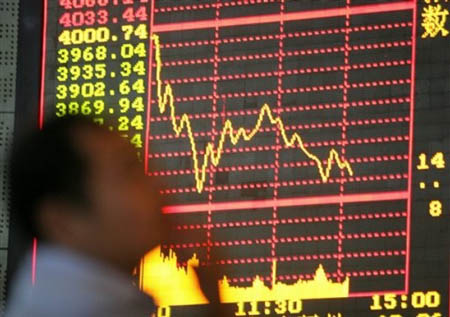Stocks across Asia fall, fear of China tightening monetary policy
 China is tightening it monetary policy to control excessive lending, as a result many Asian stacks fell on Tuesday amid concerns that the move along with a US decision to stop domestic spending could affect global recovery.
China is tightening it monetary policy to control excessive lending, as a result many Asian stacks fell on Tuesday amid concerns that the move along with a US decision to stop domestic spending could affect global recovery.
South Korea's weaker than expected growth has also raised worries about the global economic growth. The South Korean growth also raises concerns about the consumption rate in the country while Soul's index fell 2 percent.
Analysts believe that the government spending is still required to maintain the growth in the global economy.
A collective index for Asia pacific stocks excluding Japan, MSCI fell 1.2 percent. The Nikkei too fell 1 percent as investors waited for the data releases from the US.
The Shanghai stocks fell 2 percent and Hong Kong's Hang Seng index slid 1.7 percent. South Korea's Kospi Index dropped 2 percent, while Taiwan's Taiex Index sank 3.5 percent
According to analysts the banks have suspended new lending since Jan. 19. The country's seven-day repurchase rate increased 30 basis points to 1.64 percent. The seven-day repurchase rate measures the cost of borrowing money in the country's interbank market.
US president has decided to freeze domestic spending for three-year and the proposal will be made in the budget 2011 as it aims to save $250 billion by 2020 and help reduce deficits.
Financial markets received the news positively as the US would be better positioned to control its long tern debts however Asian stocks fell with concerns that it can hurt the growth in the US economy.
Further China's decision to implement its latest rise in bank reserve ratios to curb excessive lending caused the fall in stocks on the continent. High demand from china has helped offset weaker demands from US, EU and Japan to help the global economy recover. Analysts believe that if the China's central bank squeeze rates it could affect the demand from the country and have an effect on the recovery.
The yen gained in value yesterday after some banks in the China were asked to raise reserve ratios from Tuesday. The US dollar fell to 90.02 yen after an intraday high of 90.56 yen. For Japan the Standard & Poor's cut its sovereign rating outlook to negative.
The Japanese central bank has indicated that it is committed to fight deflation in the country and has kept the interest rates near zero.
The price of Oil fell below $75 a barrel with prospects of cooling demand in the global markets. The crude oil declined 1.1 percent to $74.42 a barrel.